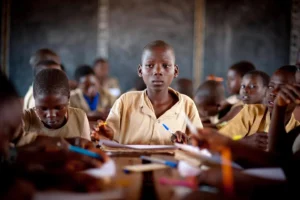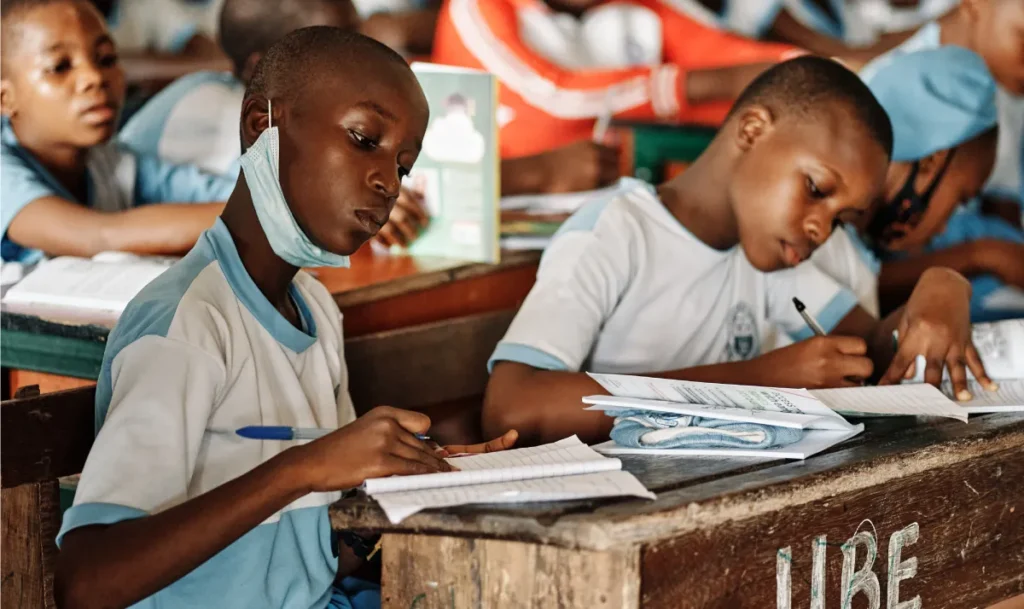Nigeria holds the tragic distinction of having the highest number of out-of-school children in the world. Over 10 million Nigerian children lack access to formal education, a crisis that casts a long shadow over the country’s future. And even among those fortunate enough to attend school, many carry their books in worn-out or makeshift polythene bags, a painful symbol of neglect and poverty. This bleak picture was once again highlighted during the last International Day of Education—a day meant to celebrate learning, but for Nigeria, it serves as a stark reminder of its deep-rooted educational failure.
A Nation Failing Its Children
In his autobiography, The Measure of a Man: A Spiritual Autobiography, Sidney Poitier, the first Black actor to win an Academy Award for Best Actor, shared a pivotal lesson from his father. When asked by Oprah Winfrey to define “the measure of a man,” Poitier recalled his father’s wisdom: “The measure of a man is how well he cares for his children.” Applying this standard to Nigeria, the result is deeply troubling. By almost every measure—school attendance, infrastructure, learning quality, safety—Nigeria has failed to care for its children.
The neglect is systemic. Despite the globally recommended benchmark urging nations to allocate 15–20% of their national budgets to education, Nigeria consistently falls short. Years of underinvestment, poor policy implementation, and corruption have eroded the foundation of what should be one of the country’s most vital sectors. And while various stakeholders, including UNICEF, advocate for change, the gap between rhetoric and reality remains painfully wide.

A System Under Siege
While lack of funding is a key issue, Nigeria’s educational woes are not limited to finances. Violence and insecurity have turned schools into danger zones rather than places of learning. In 2021 alone, Nigeria witnessed at least 25 terrorist attacks on schools, resulting in the abduction of 1,440 students and the killing of 16. One of the worst incidents occurred in March 2021, when more than 600 schools across Sokoto, Zamfara, Kano, Katsina, Niger, and Yobe states were forced to shut down due to security concerns. These closures deprived thousands of children of the right to education and sent shockwaves across the nation.
Peter Hawkins, UNICEF Representative in Nigeria, captured the essence of this crisis: “No child should be afraid to enter a classroom – afraid their school might be attacked or that they will be kidnapped. And no parent should fear sending their children to school.” But this fear has become the new normal in many parts of the country, particularly in the northern regions where insecurity is rampant.
Children Trapped in Learning Poverty
Beyond security challenges, many Nigerian children face “learning poverty”—a term used by the World Bank to describe a situation in which a 10-year-old cannot read and understand a simple sentence. According to a 2022 report, a staggering 87% of African children, including those in Nigeria, suffer from this condition. In overcrowded classrooms with underpaid teachers and inadequate resources, learning becomes a luxury rather than a right.
Classroom instruction is often characterized by outdated teaching methods and irrelevant curricula. Schools rarely adapt to 21st-century learning needs, leaving students disengaged and unprepared for real-world challenges. Teachers, on their part, are demotivated, overworked, and poorly trained, making it nearly impossible to deliver quality education.
The Role of Leadership and Political Will
The situation is not without solutions. What Nigeria’s education sector desperately needs is political will, visionary leadership, and strategic investment. UNICEF and other education advocates have long called for increased budgetary allocations, improved teacher training, the integration of technology in classrooms, and a comprehensive overhaul of the security situation in and around schools.
As the country approached the 2023 elections, many viewed it as an opportunity to elect leaders who would prioritize the welfare and education of children. But the promises made on campaign trails must translate into tangible action. Without significant reforms, the crisis will only deepen, and Nigeria will continue to raise generations robbed of their potential.
Towards a Way Forward: Funding, Safety, and Innovation
To reverse the current trend, Nigeria must begin by treating education as a national emergency. Budgetary allocations must increase significantly to meet global benchmarks. More importantly, these funds must be transparently managed to ensure they reach schools and classrooms that need them most.
Safety in schools must also be non-negotiable. This means investing in community-based security solutions, surveillance infrastructure, and partnerships with law enforcement to prevent future attacks. Education cannot thrive in an environment of fear.
In addition, there’s a need for innovation. Edtech platforms like Schoola, highlighted in earlier discussions, are pioneering new ways to make learning accessible and engaging. With features like gamification, performance tracking, and personalized feedback, such tools are helping bridge the gap between teachers and students, especially in resource-limited settings.
A Call to Collective Action
Ultimately, fixing Nigeria’s broken education system requires a united effort. Communities, parents, teachers, civil society, and policymakers must collaborate to ensure every Nigerian child is in school, learning in a safe environment, and receiving quality education that equips them for a prosperous future.
To paraphrase Sidney Poitier once more, the true measure of a people lies in how well they care for their young. If Nigeria is to secure its future, it must begin by honoring its children with the education they deserve. Anything less is a betrayal of a generation—and of the nation itself.







